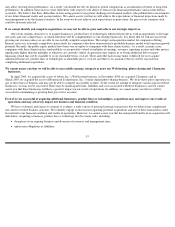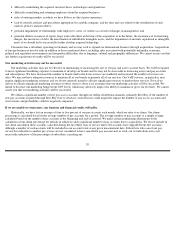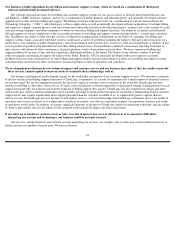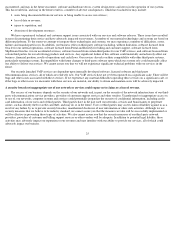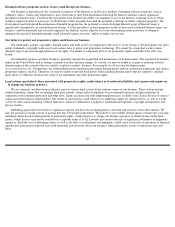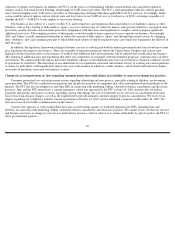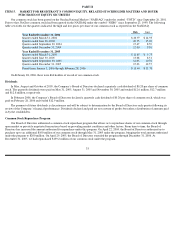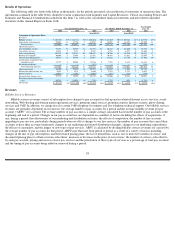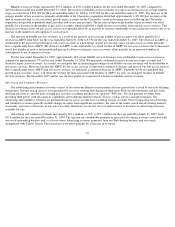Classmates.com 2005 Annual Report Download - page 30
Download and view the complete annual report
Please find page 30 of the 2005 Classmates.com annual report below. You can navigate through the pages in the report by either clicking on the pages listed below, or by using the keyword search tool below to find specific information within the annual report.
expensive to operate our business. In addition, the FCC is in the process of determining whether certain federal taxes and other regulatory
charges, such as Universal Service Funding, should apply to VoIP service providers. The FCC’s state preemption order also did not preclude
states from attempting to tax VoIP service providers or from imposing surcharges like those applicable to E-911 services. Accordingly, future
action could be taken to impose various federal, state and local taxes on our VoIP services or to subject us to E-911 surcharges regardless of
whether the FCC’s VoIP E-911 order applies to our service offering.
Our business is also subject to a variety of other U.S. and foreign laws and regulations that could subject us to liabilities, claims or other
remedies, such as laws relating to bulk email or “spam,” access to various types of content by minors, anti-spyware initiatives, encryption, data
protection, security breaches and consumer protection. Compliance with these laws and regulations is complex and may impose significant
additional costs on us. The compliance efforts of third parties could also make it more expensive for us to operate our business. For example,
AOL and Yahoo! recently announced their plans to reduce the amount of bulk email or “spam” sent through their email services by changing
their “whitelists” into a pay program pursuant to which bulk email senders would be required to pay a per-email-fee to guarantee the delivery of
their messages.
In addition, the regulatory framework relating to Internet services is evolving and both the federal government and states from time to time
pass legislation that impacts our business. There are a number of legislative proposals before the United States Congress and various state
legislative bodies that may relate to our business. It is likely that additional laws and regulations will be adopted that would affect our business.
The adoption of additional laws and regulations that affect our competitors, for example, network neutrality proposals, could also have an effect
our business. We cannot predict the impact that future regulatory changes or developments may have on our business, financial condition, results
of operations or cash flows. The enactment of any additional laws or regulations, increased enforcement activity of existing laws and regulations,
or claims by individuals could significantly impact our costs or the manner in which we conduct business, all of which could adversely impact
our results of operations and cause our business to suffer.
Changes in, or interpretations of, laws regarding consumer protection could subject us to liability or cause us to change our practices.
Consumer protection laws and enforcement actions regarding advertising and user privacy, especially relating to children, are becoming
more prevalent. The FTC has conducted investigations into the privacy practices of companies that collect information about individuals on the
Internet. The FTC has also investigated us and other ISPs in connection with marketing, billing, customer retention, cancellation and disclosure
practices. Juno and the FTC entered into a consent agreement, which was approved by the FTC on June 29, 2001, that provides for redress
payments and specific disclosures or notices regarding, among other things, the cost of its Internet access services, its cancellation terms and
local versus long-distance charges, as well as the requirement to provide adequate customer support to process cancellations. We received an
inquiry regarding our compliance with the consent agreement on October 14, 2005, and we submitted a response on December 14, 2005. We
have not received any further communication on this matter.
Various state agencies as well as individuals have also asserted claims against, or instituted inquiries into, ISPs, including Juno and
NetZero, in connection with marketing, billing, customer retention, cancellation and disclosure practices. We cannot assure you that our services
and business practices, or changes to our services and business practices, will not subject us to claims and liability by private parties, the FTC or
other governmental agencies.
29


